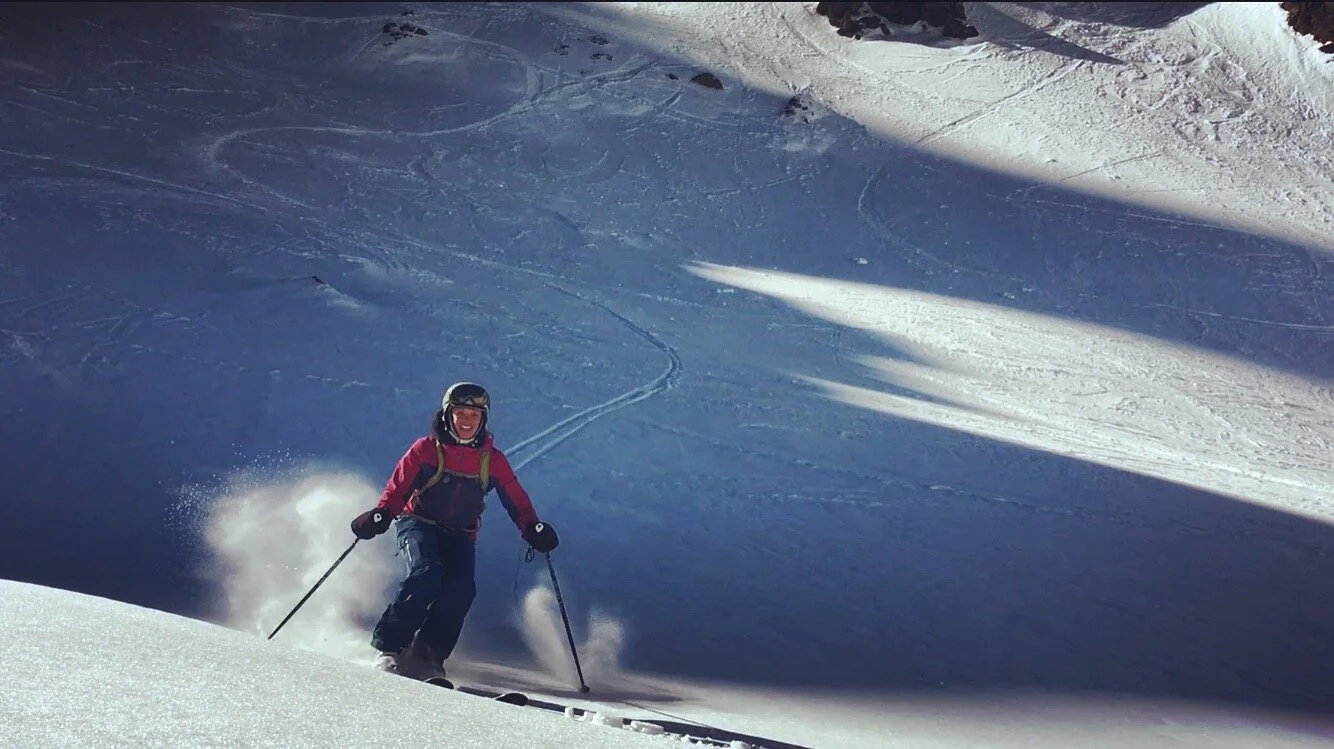'Black People Can't Ski'
By Tselane Mead
Photo by Marc Cleriot
‘Black people can’t swim.’ ‘Black people can’t ski.’ Two things I distinctly remember my mates at secondary school joking about. Where do kids get these ideas from? These kinds of words can be far more damaging than people might know. These types of comments have been a mental stumbling block to me; a reminder of the exclusivity of alpine sports. And why wouldn’t someone like me think that growing up? Because there were never any faces of black people skiing or swimming. You hear something enough times and you start to believe it.
I found skiing and climbing later in life. I didn’t come from a family of great privilege, that climbed or skied or went on holidays abroad. But I have had the privilege of being in a family that encouraged and supported my decisions to leave economic security to live in the alps and pursue my passions. The last 5 years I have worked hard to get to a position of confidence when out in the mountains. There have been a lot of obstacles, prejudice and even racism, with plenty of reasons to give up along the way. I might not be the best but I love what I do and I’m proud to have overcome difficulties and sometimes even use them to my advantage.
Despite this, I still find myself doubting my capabilities, mixed up amongst feelings that maybe I don’t belong in this environment, that maybe I’m not good enough to be here, that this isn’t my world.
I remember doing my first 4000 meter peak in the Italian Alps, Gran Paradiso, a popular mountaineering route for first time alpinists. The hut that we stayed at prior to our summit push was packed to the rafters with the usual homogenous group of middle aged men. After half a night's sleep we woke at 3 am to sit for our measly bowl of stodgy porridge - supposed to sustain us for a full day of climbing ascent. I looked around the packed out breakfast room, full of teams prepping for the day and I felt uncomfortable. The kind of disturbing, lingering feeling you get when you wake up from a dream about walking out the house without your clothes on. I felt naked. I was the only person on that mountain that looked like me. I was the only person of colour. And for a moment I lost all confidence in what I was doing and why I was there.
“I am a rarity on the slopes, at the crag and trudging through snow. I look around me and I am often the only mixed race - and even woman - in a group.”
This feeling follows me around a lot. I find it hard sometimes being the only one like me when skiing or climbing. I am a rarity on the slopes, at the crag and trudging through snow. I look around me and I am often the only mixed race - and even woman - in a group. I find myself having a familiar internal battle: are people looking at me because of the colour of my skin? Maybe they’ve never seen a black woman out here before and maybe they’ll expect me to be shit because of that.
The feeling of not belonging is recurrent and has probably put others like me from venturing into the great outdoors. This thought often spurs me to send something just that little bit harder than I thought I had in me. I feel I can take ownership of a route when climbing for example, and it’s not long before I have forgotten these insecurities and am in the moment with my climb, reaching that meditative place of concentration and flow. I offer myself compassion and cut myself some slack: you have overcome so many obstacles to be here, you deserve to be here as much as the next guy. If they’re looking at you, who gives a damn. Give them something to look at! If you’re a bit shit who cares, you’re here to enjoy yourself, just like them. And perhaps those onlookers then go away thinking “you never see black people out skiing/climbing/in alpinism, but she was really having a blast!”.
After leading the final pitch at the top of Gran Paradiso - feeling somewhat woozy with the altitude and in that state of presence that being in the mountains gives you - my badass mode kicked in: “LET THEM LOOK” I thought and I powered on to overtake a few teams before dutty wining on the statue of the virgin Mary at the top (if you don’t know what dutty wining is, I’d suggest checking out Beyoncé for a classy introduction to the art of the wine, followed by Tony Matterhorn for those looking for something a little stronger).
In truth I don’t mind the feeling of being unique in my surroundings. I am one of few who is black and a ski instructor, a climber and an alpinist. I’m proud of that.
When I lived in Chamonix I was occasionally the centre of excitement amongst tourists. I remember setting off from the Aiguille du Midi Arête when some Chinese tourists had come up the cable car to see the view, they saw me and suddenly each were passing their phones amongst each other to take a photo with me. “Don’t you find that really annoying and a bit…you know” my friend said. Actually, no,
in a way I feel OK with me being a novelty for them - dressed in my harness and gear with skis on my back and the colour of my skin, the image they wanted - that image could be a chance to be a role model for others.
“To be stood out as a coloured face against the white snow, bringing diversity and colour to the slopes, I feel a sense of pride.”
I feel this strongly when working in Switzerland as a ski instructor. You certainly don’t see many people of colour in the Swiss Alps. To be stood out as a coloured face against the white snow, bringing diversity and colour to the slopes, I feel a sense of pride. It’s not easy sometimes but for the kids I teach I’d like to think I’m making an impression on them, a counter image for them to conjure up when they next hear ‘black people can’t ski’.
Photo by Marc Cleriot
The ski school I work for welcomes children from international schools. Children come from all over the world to ski for a week and some of my most memorable weeks have been those where kids have never seen snow before from places like Uganda, Bahrain and Burma. It feels good to be leading the charge of kids going past a bunch of old boy Swiss ski dons, eyes aghast at the brown faced line of my little protégé shredders. We’re breaking the mould. And those kids are each falling in love with nature and feeling a connection with their surroundings, adding to the diversity that is so lacking in alpine sports.
But these are the elite few, whose parents can afford to send their children on expensive private school ski trips. It’s hard to ignore the fact that activities like skiing are expensive for many people.
Climbing, skiing and mountaineering are activities that tend to be enjoyed by a similar group of people; predominantly white and relatively wealthy. They are time indulgent activities, requiring money to get the equipment together and even more money to access the mountains. Little wonder this is not an option for many black families.
It would be unfair to say that white privilege is the only factor preventing diversity in alpine environments. In Afro-Carribbean culture, for example, there is a large emphasis on the family which is often the core from which life revolves. Growing up on my street, our neighbours next door were Afro-Caribbean and weekends were spent running in and out of each other's houses, an open door atmosphere that represents a cultural hub seen across many similar households. For most, time spent with the family or at church is the focal point of life together. Activities like mountaineering and skiing take away from that. It would be quite unusual to have members of the family off on adventures in the mountains for long periods of time. This is just one example of the complex and subtle obstacles facing people from BAME (black and minority ethnic) backgrounds. But the bottom line is that people of colour are hugely underrepresented in alpine sports. And the knock on effect is that there are few role models to inspire the next younger generation. The issue then develops a self perpetuating nature.
But I’m hopeful that this is changing. There is so much more interest and drive from people of colour to enjoy the outdoors. Since the death of George Floyd and the subsequent Black Lives Matter movement, there has been a stronger focus on people of colour being represented in the mountains, on social media and outdoor brands. With change we, who are privileged to be in the mountains, must also evolve and welcome those with interest. We have to be role models for youngsters. We have to encourage and nurture them to become the role models for the next generation. I only hope that at this time of change more opportunities will arise for people of colour to be inspired into the outdoors and for brands and organisations to listen to people of our community and diversify their marketing campaigns to create a more genuinely welcoming arena.
“So the next time you see a black person out in the mountains, spare a thought for the obstacles they’ve probably encountered en route. And maybe spare a thought for all the black people you don’t see. Because black people can ski.”
So the next time you see a black person out in the mountains, spare a thought for the obstacles they’ve probably encountered en route. And maybe spare a thought for all the black people you don’t see. Because black people can ski. They just don’t always get the chance to. Black people do belong in the mountains, it’s just not that accessible. But this is a pivotal time of change and above all mountains are a place of acceptance no matter what your skin colour - a place to be enjoyed by all.
Tselane is an emergency nurse from Sheffield who is also a qualified ski instructor. She works winters as a nurse/ski instructor for a ski school in the Swiss alps and has spent periods in Chamonix developing ski touring and mountaineering skills. Her aspiration is to become an expedition medic one day.






